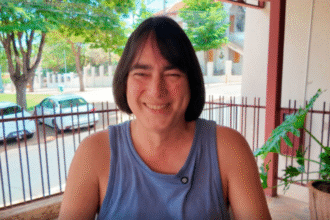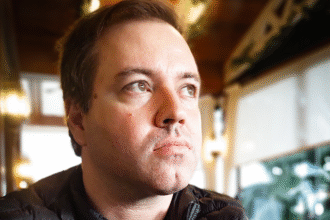In the scenario of period novels, best-selling writer Babi A. Sette breaks barriers by including an LGBT couple in her most recent work, entitled A Promessa da Rosa. Set in the 19th century, the plot features Steve and Philipe, whose love needs to be kept secret due to the prejudices of society at the time. The inclusion of this gender diversity in a historical context challenges paradigms and brings relevant reflections on the importance of representativeness.
Author Babi A. Sette explains that her decision to include a relevant gay couple in the plot reflects her quest to address significant issues both for her and for society in general. Steve, the protagonist’s best friend, leaves England, where homosexuality is condemned, and meets Philipe, a local prince in Holland. Together they face challenges and live their love in Paris. As the story unfolds, the presence of Steve and Philipe provides readers with intense emotions and important reflections.
The Promise of the Rose, set in 1840s England, features Kathelyn Stanwell, the daughter of an earl who dreams of being free to choose her own destiny. At a masquerade ball, she is enchanted by Arthur Harold, an intriguing man who does not appear to belong to the aristocracy. What starts as a one-night stand turns into passion, but betrayals and misunderstandings spark jealousy and plot twists. The love story between Arthur and Kathelyn will face challenges to reach a happy ending.
Babi A. Sette is known for her charming romantic stories, full of emotion and with touches of humor. Her penchant for period novels is reflected in A Promessa da Rosa, and the author emphasizes the importance of building works that are in line with her values and with changes in readers’ expectations over time. With this new work, Babi seeks to surprise his followers, offering representativeness and addressing relevant issues in the context of historical novels.
How did the idea of including an LGBT couple in a period romance come about? What was your motivation behind that decision?
My motivation came because I love to tell love stories, and I’m sure that love stories are only complete when they have all the ways to love. In addition, the Victorian era, despite having brought great cultural and economic advances to the UK and the world, was a time when society’s customs and traditions were extremely conservative, sexist and homophobic. The promise of the rose essentially talks about being who you are, regardless of social demands and about the fight against prejudice, whether sexual or gender.
In “A Promessa da Rosa”, you address relevant and current topics. How do you see the role of literature in discussing and reflecting on social issues?
Stories have always played a very important role in shaping social values. They reflect where society’s thinking is heading or what important social issues need to be reviewed in society.
When we read a story that raises issues such as machismo and homophobia, etc… we can often identify with the challenges overcome in the course of this story by the characters and thus find, through our own reflection, internal instruments to deal with these issues in our day by day.
What was the biggest challenge in portraying an LGBT relationship in a past historical context? How did you balance historical fidelity with the need for inclusive representation?
Realistically portraying a story of an LGBT relationship in the context of an extremely conservative and prejudiced society, such as the Victorian society, was not easy. And I say this from the point of view of a straight woman, in a less conservative and prejudiced society. I say this thinking about what it would be like to love someone, fall in love with someone and not have the right to live that love, to admit that love, not even at home. In Kathelyn’s story, most of her problems are caused by the hypocritical, sexist and homophobic society. Steve and Philipe, have to hide their love, Steve who is English needs to leave home and will never be able to live that love freely, or present her husband as a husband to his family who would never accept him as he is. In England homosexuality was a crime, and a sin.
I find it sad to think that despite certainly the challenges to love who you love and be who you are, despite the fact that today the world is very different, at least in relation to the debate and the laws that guarantee more equality and freedom in many countries, some of the challenges and dramas that Steve and Philipe live in the 19th century would still be experienced if the story took place today.

How do you hope readers will react to the inclusion of an LGBT couple in a period novel? What message would you like to convey through these characters?
I hope readers love reading about the love between Philipe and Steve, it’s this love that proves in a way the protagonist’s innocence in an accusation of treason, it’s this love that will be the protagonist’s safe haven when all the people she loved judge it, condemn it and turn away from it. I want readers to understand that no matter how many people condemn you, try to repress you and swear that you will only be happy if you fit in with what most people think is right, in fact, you will only be happy if you have the courage to be who you truly are.
In addition to the LGBT theme, what other plot elements of “The Promise of the Rose” do you think readers will find captivating and engaging?
A very involving passion, a breathtaking romance, a young woman who, from page one, does not surrender to sexist and patriarchal social impositions and fights to be who she is and to be happy.
What is the research process like to create an accurate and detailed historical setting in your period novels?
I love. The search, I love. I practically only read and watch period and historical novels, in addition to the initial research that has to happen regardless of the period in which I will contextualize the novel, I usually feel very comfortable narrating period novels.
Who are your main literary influences and how do they contribute to your writing of romantic novels?
Jane Austen, Lisa Kleypas, Julia Quinn…. If we stop to read romantic novels, we will realize that most of them portray strong and courageous women who don’t need to find someone to be happy and who are not saved by the hero, they are usually the ones who save the good guys. Extraordinary, isn’t it? Ah, good readings inspire me all the time and not only to write, but also to know myself more and be a better person.
How do you balance creating authentic and passionate characters with the need to follow the conventions of the romantic genre?
As a novel author, I don’t believe in genre conventions, I feel that I write above all what drives me and what makes me feel. But maybe, the conventions say that there must be a couple and that they will face challenges and then, they will be together in the end…. laughter…. Writing books with happy endings is what speaks to my essence, and writing about relationships for me is never just a walk on a sunny and sweet afternoon, if so, it wouldn’t ring true, however happy the ending is. And about authentic characters, I think that if they are not true, that means to me: complex, full of flaws, in addition to qualities, it wouldn’t even make sense to put them on paper, I don’t think I would feel like doing that. Characters must above all be human to be real and passionate
Do you believe that literature has a role in promoting diversity and inclusion? How do you see the representation of different identities in contemporary literature?
I’m sure so… I see that this has to be treated as something natural and not extraordinary, out of the ordinary, we, as a society, are plural, this plurality be it in color, gender, sexual orientation, social class, etc. it is part of the world, of what we have always been and maybe always will be, representing different identities in art, in literature is so important because this representation is bringing our reality to art, our plurality, our complexity as humans, our values, our successes and also our mistakes, where we can and should be inspired to improve as individual human beings and consequently as humanity.
What are your future projects? Can we expect more period novels with relevant and inclusive themes?
This year I will launch two novels, one current, which will bring many current, relevant and inclusive themes and a period novel that will also bring important issues for society as a theme. I think that, in one way or another, my novels will address topics like this, I believe this is because talking about something that resonates with me, with my values and with my essence is what will always inspire me to write.
Follow Babi A. Sette on Instagram





